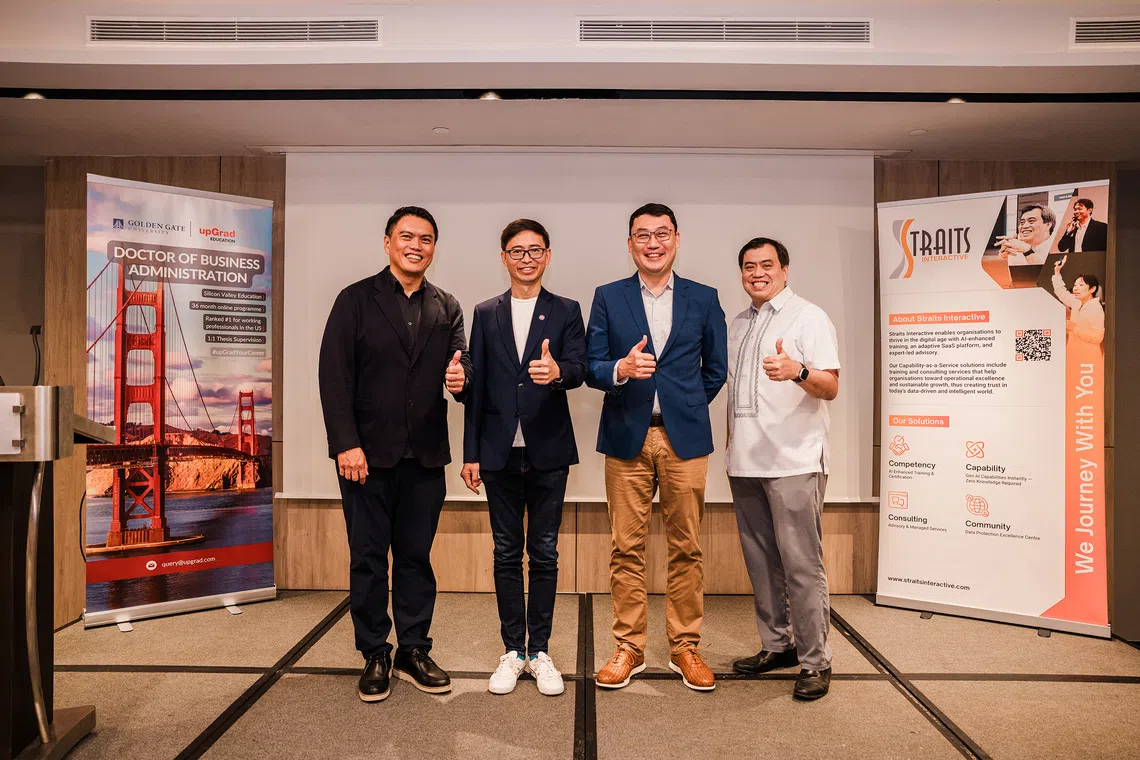Singapore SMEs to get help adopting generative AI under new initiative
Sign up now: Get ST's newsletters delivered to your inbox

NTUC assistant secretary-general Patrick Tay announces the collaboration with ASME president Ang Yuit, SMU Academy executive director Jack Lim and Straits Interactive founder and CEO Kevin Shepherdson.
PHOTO: UPGRAD
- ASME, SMU Academy, and Straits Interactive collaborate to boost Gen AI adoption in Singaporean SMEs via an integrated ecosystem.
- A practical guide, "The AI Factory", was launched to aid SMEs in understanding and implementing AI.
- Singapore aims to develop "AI Bilingualists" to efficiently use AI, supported by government initiatives and public-private collaboration.
AI generated
SINGAPORE - Small and medium-sized enterprises (SMEs) in Singapore will be able to access an ecosystem to accelerate the adoption of generative artificial intelligence (Gen AI) for their businesses under a new initiative.
At the centre of this new initiative is a playbook, The AI Factory – AI Capability Guide for SMEs, which was launched on Nov 11.
The guide, drawing on insights from industry practitioners and educators, will be used as a reference for AI capability-building programmes run by the Association of Small and Medium Enterprises (ASME).
It will also be a key teaching resource at SMU Academy, which plans to launch new industry graduate diploma programmes on AI. One new programme is currently under development and slated to be launched in 2026.
The new initiative is a collaboration between ASME, SMU Academy and education technology firm Straits Interactive.
In a message in the playbook, NTUC assistant secretary-general Patrick Tay said it is “a great toolkit for both business owners and practitioners to gain a rudimentary understanding of AI and help shape the future”.
“We must treat AI not as a replacement challenge, but as an augmentation promise. Workers must feel empowered, not displaced,” said Mr Tay, who is also the MP for Pioneer.
“Leaders must invest in training, just transition, and ensuring that human resource functions and worker development are strategic, not just transactional.”
The AI factory metaphor is inspired by the industrial revolution when factories reshaped society.
AI calls for a shift from producing physical goods to manufacturing intelligence, powered by data, algorithms and computing infrastructure.
An AI factory comprises two floors: The first is where technical production and processes are executed.
The second is where AI business management and operations offices sit, spearheading tasks like workshopping, human-machine collaboration, and governance and ethics.
The playbook also aims to support a national vision of developing “AI bilingualists”. These are workers who have expertise in their domain and the know-how to use AI to work more efficiently, Minister for Digital Development and Information Josephine Teo had said.
Mrs Teo made these comments after Prime Minister Lawrence Wong said in his National Day Rally speech that the Government will help enterprises harness AI effectively and ensure citizens have jobs.
According to the latest Singapore Digital Economy Report
This was driven mainly by off-the-shelf Gen AI tools.
ASME president Ang Yuit said: “AI has flattened the regional skill curve. Our SMEs can no longer compete only on labour quality or education. Competitiveness now depends on how intelligently and quickly we integrate AI into our business systems.
“The next phase of Singapore’s AI journey must involve closer public-private collaboration, where trade associations co-create solutions, co-administer grants, and measure real-world impact.”



